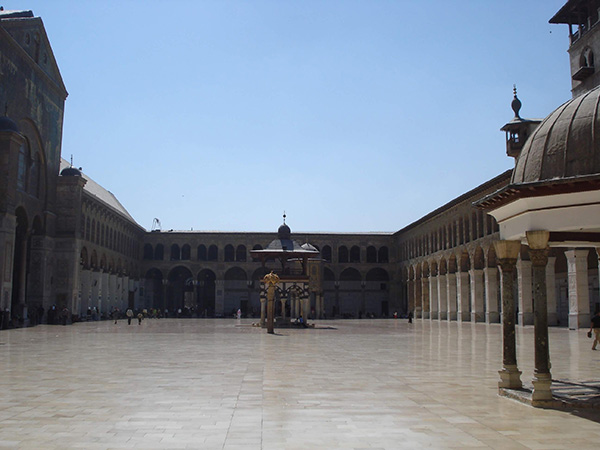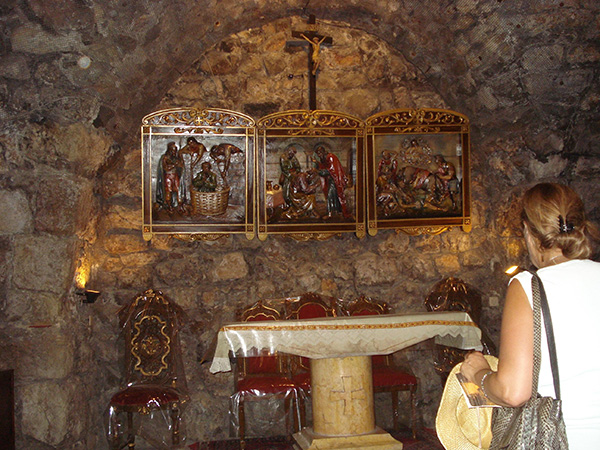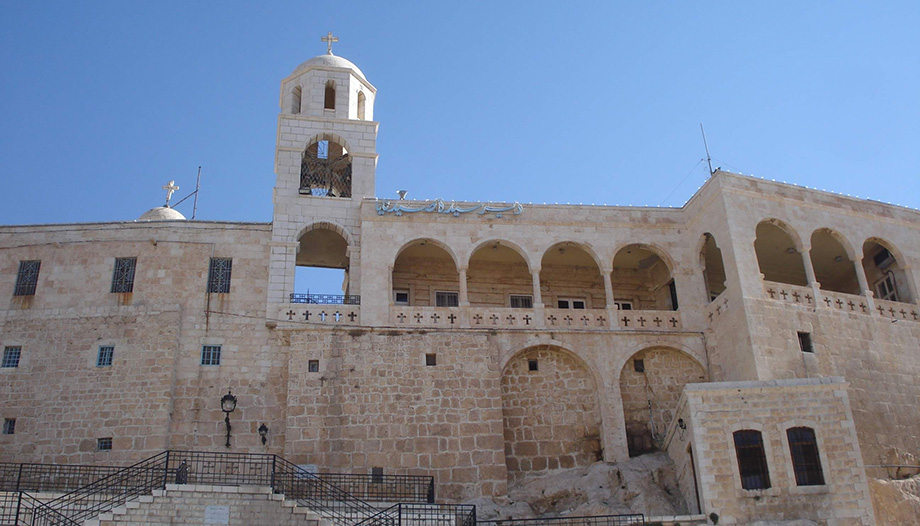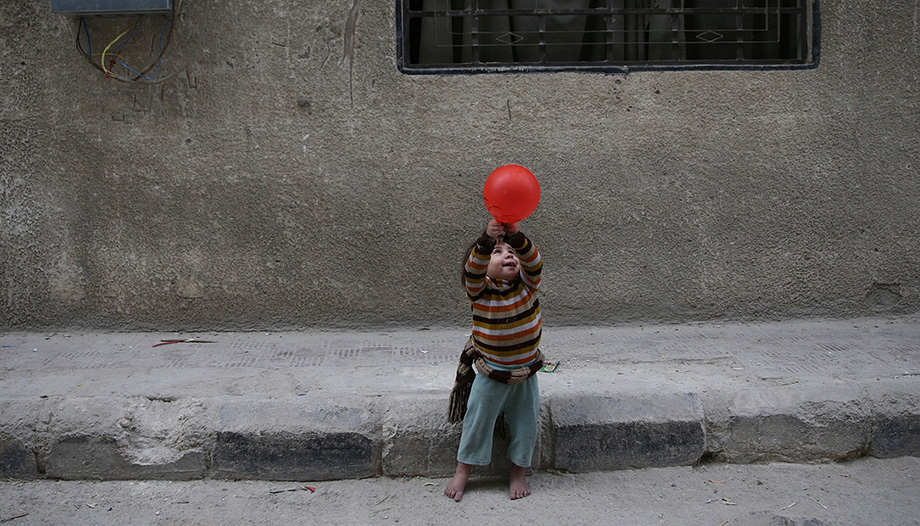The history of the Syrian nation has much to do with the history of the Christian faith. In what is now Syria the faithful of Christ began to be known as the ChristiansThere are still villages there where the ancient language of Jesus, Aramaic, is still spoken, and it was in this land that the conversion of Saul, St. Paul, took place, who would spread the message of Christ to the known world.
The soul of the world

We often think of the East, and by extension all areas of the world that seem "exotic" or distant to our Western mentality, as foreign. "Poor people!" people are heard to say about the wars, fratricidal struggles and persecutions that plague those countries. And yet, never before has Syria been a place we should really consider "our home," at least as Christians.
Why? First of all, because here, in the ancient Syrian Antioch, which today is also in Turkey (although geographically and culturally it is a Syrian territory), Christ's faithful were called Christiansbecause Peter was the first bishop of Antioch, before arriving in Rome; because, again, Paul turned on the road to Damascus and from there undertook his evangelizing mission (the house of Ananias can still be visited in Damascus); because in a city in Syria, Edessa, the Shroud of Turin (known in this area as the apron) remained for more than a millennium, until 1204, when the city was sacked during the IV Cross; because in a Syrian city, Edessa, the Holy Shroud (known in this area as the apron) remained for more than a millennium, until 1204, when the city was sacked during the Fourth Crusade; because, finally, there are still villages where the ancient language of Jesus, Aramaic, is still spoken, as well as some of the oldest churches in the world.
There are many other reasons, but we do not have time to enumerate them. However, suffice it to recall that it was precisely the Christians of Syria, once the majority in the country (also, for several centuries, after the Islamic conquest), who helped to preserve the Syriac manuscripts (translations of Latin and Greek texts) and to transmit them to the West thanks to the Arabic translations they made.
In the Letter to DiognetusIn a short apologetic treatise probably composed at the end of the second century, Christians and their role in the world are spoken of as a place assigned to them by God, a place from which they cannot leave. Indeed, Christians "represent in the world what the soul is in the body". The soul is found in all the members of the body; and Christians, too, are scattered throughout the cities of the world. The soul, then, dwells in the body, but does not leave it; and Christians also dwell in this world, but they are not of the world."
The soul gives life to the body, so Christians have given this crazy world a soul, and in this case a soul that is not only spiritual, but also cultural and civilized.
Even in the Middle East, an area known today for being the nucleus of Islam rather than Christianity, those who helped create Islamic civilization were, paradoxically, Christians.
Christians, in fact, were the men of letters, philosophers and scientists who codified and gave a grammar and alphabet to the Arabic language (along with the Jews) and foundations to the Arab-Islamic culture (Islam was considered by St. John Damascene nothing more than a Christian heresy, a fact confirmed by a great number of later theologians and philosophers, including the Englishman Hilaire Belloc, many centuries later, in his book The great heresies).
A long and troubled history
Syria is home to some of the oldest inhabited cities in the world (one of them is Damascus, called jannat ad-dunyah, "paradise of the world" by Arab poets and considered, along with Jericho in Palestine, the oldest city still inhabited on our planet) and civilizations.
The ancestor of most modern alphabets also originated in Syria. In fact, in Ugarit, a city on the Syrian coast near Lattakia, the Ugaritic alphabet was developed, an alphabet in which cuneiform characters of Assyrian-Babylonian origin were still used, but which no longer had a pictographic value, like the latter, but a syllabic one. And from this system emerged the Phoenician alphabet, later reworked first by the Greeks and then by the Romans.
The cradle of several Semitic peoples, such as the Eblaites, Ugaritic, Amorites and Arameans, with their respective kingdoms and city-states, Syria became a Roman province in 64 BC.
Under the Romans, its capital, Antioch, became one of the largest and most flourishing cities of the Empire (reaching a population of some 600,000 inhabitants) and the center of Syrian Christianity, whose main exponents were St. Peter, the first bishop of Antioch, and St. Thomas. He, along with disciples such as Thaddeus of Edessa and Mari (to whom is attributed the authorship of one of the oldest Eucharistic anaphora of Christianity, the Anaphora of Addai and Mari) and others later, was the architect of the evangelization of a large part of the Near and Middle East (Syria, Lebanon, Iraq, Iran, even India, where the Syrian Catholic churches of Syro-Malabar and Syro-Malankar survive, but Syrian missionaries reached as far as China, through the Silk Road).

Despite the Islamic conquest of the 7th century (from 651 Damascus became the seat of the Umayyad caliphate and the majestic cathedral, in which the relics of St. John the Baptist are still preserved, was partially demolished and converted into a mosque), which occurred, moreover, with the partial approval of the Christian populations, they were able to prosper for centuries, despite the obvious difficulties.
This was because the Christians preferred to submit to an element culturally closer to their own (the Semitic Arabs) rather than to the longa manus of the Byzantine emperor, a foreigner who demanded increasingly exorbitant tribute. The gizyah and the kharaj Islamic taxes (capitation taxes reserved for Christians and Jews, considered second-class citizens within the Muslim state and therefore subject to a special regime in terms of personal status and individual and collective rights) were considered even by Christians as less onerous than Byzantine taxes.
Thus, Syria retained, even after the Crusades, the Mongol invasions and the final submission to the Ottoman Empire in 1517, a considerable Christian minority (mainly Greek Orthodox, but also Syriac Orthodox, Syriac Catholic, Maronite, Armenian, etc.).
Ottoman rule ended at the end of World War I (1920), although the country was not fully independent until 1946, with the end of the 26-year French Mandate. Decades of instability followed, with alternating governments and a clumsy attempt to unite with Egypt, a non-contiguous state but another pole of Arab nationalism, to form the United Arab Republic (1961).
Since 1963, after a new coup d'état, the Ba'ath party has been in power, whose main exponent, and since 1970 president (and shortly after de facto dictator) was first Hafiz al-Asad and then, after his death (2000), his son Bashar, Syria's current head of state, who remains in power despite the eleven years of civil war that have ravaged the country.
The Arab Spring and civil war
What later became the Syrian civil war began with the revolts that broke out in several cities in the country (especially in Homs, Aleppo and Damascus) following the so-called "Arab Springs", a series of popular protests, which erupted mainly in Tunisia, aimed at demanding economic and social reforms and pushing for the fight against corruption, endemic in Arab countries, especially in those ruled for decades by nationalist parties and regimes nurtured by both the West and Russia (Syria being one of the latter).
In Syria, the situation was peculiar in that since 2000, the year he came to power, President Bashar al-Assad had undertaken a series of reforms aimed at reducing the presence of the State in the economy (until then a nationalist and socialist model had been followed at the same time, in the style of the Ba'ath party). The structural reforms initiated by Assad, also in the social sphere, had helped the Christian population of the country, around 10% before the outbreak of the revolts and the ensuing war, to experience a period of remarkable prosperity and freedom.
However, Christians initially participated in the 2011 anti-corruption demonstrations. However, they withdrew soon after, when it became increasingly clear that they were led by radical Salafist Islamic groups and movements (including the Muslim Brotherhood and Al Qaeda), often encouraged and armed by the United States and Sunni Gulf Arab countries, such as Qatar. The latter, characterized by a Salafist vision of Islam, oppose the Assad regime because the Syrian president is an Alawite (the Alawites are a sect of Shiite Islamic origin, therefore close to Iran, and a minority in the country, where 70% of the population is Sunni) and, for the most extremist Sunnis, the Shiites and their sects are considered even worse than Christians, Jews and pagans.
By the time Islamic radicalism came to account for about 75% of the uprising movement against Assad and it became clear to both the UN and the West that the goal of the rebels was to form a Sunni Islamic state in which Sunni Islam would be in force. sharia (Islamic law), which was later proven with the birth of the Caliphate founded by ISIS in 2014, the first neighborhoods to suffer armed assaults by the rebels were precisely the Christians, besieged and then also bombed by the regime in an attempt to regain control.
The conflict, which then spread like wildfire throughout the country and in which Russia, Iran and Hezbollah intervened in support of Assad and, in support of the rebels, the Persian Gulf countries, the United States and Turkey, lasted more than ten years and cost some 600.000 lives, more than 12 million displaced, 6 million of them abroad (bringing the total population from 24 million to about 18 million) and an economic damage of 400 billion dollars, as well as a mortal wound, perhaps incurable, to the coexistence of the different ethno-religious components of Syria.

Writer, historian and expert on Middle Eastern history, politics and culture.








